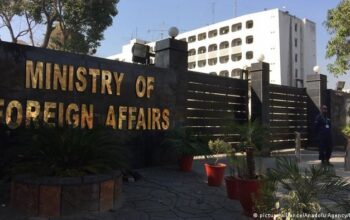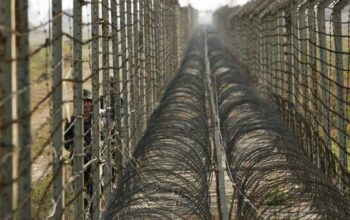By Staff Reporter
ISLAMABAD: Foreign ministers from Pakistan, China, and Afghanistan will convene in Beijing on Tuesday for high-stakes talks aimed at bolstering regional peace and security, a gathering overshadowed by the lingering fallout of a military standoff between Pakistan and India over the Kashmir dispute.
The meeting, set against a backdrop of fragile calm following a US-brokered ceasefire, underscores the volatile dynamics of a region where nuclear-armed rivals remain at odds.
Deputy Prime Minister and Foreign Minister Ishaq Dar departed for Beijing on Monday for an official visit spanning May 19 to 22, where he will join Chinese Foreign Minister Wang Yi and Afghanistan’s interim Foreign Minister Amir Khan Muttaqi.
The Foreign Office said the trio will tackle “the evolving situation in South Asia and its implications for peace and stability,” alongside a broader review of bilateral ties and regional developments.
The talks follow a tense escalation that began with a May 6 attack in Pahalgam, a town in Indian-occupied Kashmir, which India swiftly blamed on Pakistan without substantiating evidence. That night, Indian air strikes hit targets in Pakistan’s Punjab province and Azad Kashmir, killing civilians. Pakistan retaliated, downing six Indian jets, intercepting drones, and striking Indian airbases.
The tit-for-tat ended only after US intervention on May 10 secured a ceasefire, though India has kept up an aggressive posture while Pakistan has urged dialogue to avert further spirals.
The Kashmir dispute, a 77-year-old territorial feud rooted in the 1947 partition of British India, has long strained relations between New Delhi and Islamabad. Both nations claim the Himalayan region in full but control only parts, separated by a heavily militarized Line of Control. The recent flare-up has rekindled fears of a broader conflict, with the specter of nuclear arsenals casting a dark shadow.
China, a staunch Pakistani ally, reaffirmed its backing during a May 5 meeting with President Asif Ali Zardari, just before the Pahalgam incident ignited the latest crisis. Afghanistan’s role, however, adds a wrinkle.
Defence Minister Khawaja Asif said Sunday that “no country was supporting India except Israel and Afghanistan,” pointing to Kabul’s alleged alignment with New Delhi—a claim that complicates the tripartite dynamic.
The Beijing meeting, Foreign Office said, reflects “ongoing high-level exchanges” with China and a “shared commitment to regional peace.” Dar and Wang Yi are expected to delve into the Kashmir fallout, while Muttaqi’s presence signals an effort to address cross-border tensions that ripple beyond the India-Pakistan axis.
“The pair will discuss the evolving regional situation in South Asia and its implications for peace and stability,” the Foreign Office said, referring to Pakistan-China talks. “The two sides will also review the entire spectrum of Pakistan-China bilateral relations and exchange views on regional and global developments of mutual interest.”
Across the Atlantic, the United Kingdom’s Parliament has sounded its own alarm. A report from the House of Commons Foreign Affairs Committee, part of a wider probe into Britain’s South Asia strategy, called for renewed diplomatic engagement between India and Pakistan. It flagged a “marked erosion of democratic rights” in Indian-occupied Kashmir since New Delhi revoked its special status in August 2019, citing a heavy military presence, curbs on civil liberties, and arbitrary detentions.
The committee also scrutinized Pakistan-administered Azad Jammu and Kashmir and Gilgit-Baltistan, noting democratic shortfalls despite differing conditions. It urged the British government to leverage its historic ties with both nations to foster dialogue, while sticking to London’s stance that Kashmir “must be resolved bilaterally by India and Pakistan.” Still, the report insisted this shouldn’t bar Britain from pressing human rights concerns or pushing for access by international observers, including its own diplomats and lawmakers, to both sides of the divide.
A separate 42-page parliamentary document didn’t mince words, slamming India’s “aggressive behaviour” and warning that the dispute “poses a serious threat to regional stability and could potentially escalate into a nuclear conflict.” It highlighted the nations’ clashing playbooks: India doubles down on bilateral talks, while Pakistan presses for U.N.-backed mediation.
The report says that India used a “suspicious incident in occupied Kashmir” as a justification to take military action against Pakistan, a move the report says threatens regional peace.
The New York Times, in a Sunday dispatch, framed the recent clash as “a clear setback for India,” an aspiring global power now tethered to a decades-old quagmire.
“The four-day clash reminded the world of India’s powerlessness to resolve 78 years of conflict with the troubled nation next door,” the paper wrote. “Outright military victory is nearly impossible, given the threat from both countries’ nuclear arsenals.”
Analysts see a familiar deadlock. Joshua White, a Johns Hopkins University professor and former White House official, noted Pakistan’s knack for seizing international attention, think Donald Trump’s Kashmir musings, as a diplomatic lifeline.
“India’s strategy will be to wait until Trump moves on to other priorities,” White said, adding that a neutral forum “does structurally and historically favour Pakistan, and could make it harder for India to justify this deal to its public.” On third-party mediation? “No, I do not” expect India to budge.”
Yet faint diplomatic signals flicker. White pointed to Prime Minister Shehbaz Sharif’s move to convene the National Command Authority, a “soft nuclear” nudge that may have cooled tempers. U.S. Secretary of State Marco Rubio’s nod to talks “on a broad set of issues at a neutral site” hints at behind-the-scenes maneuvering, though details remain thin.
Copyright © 2021 Independent Pakistan | All rights reserved




